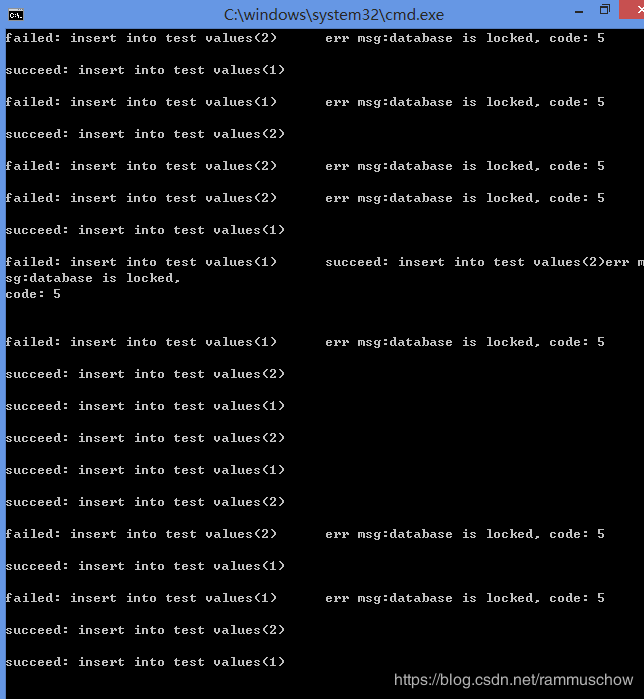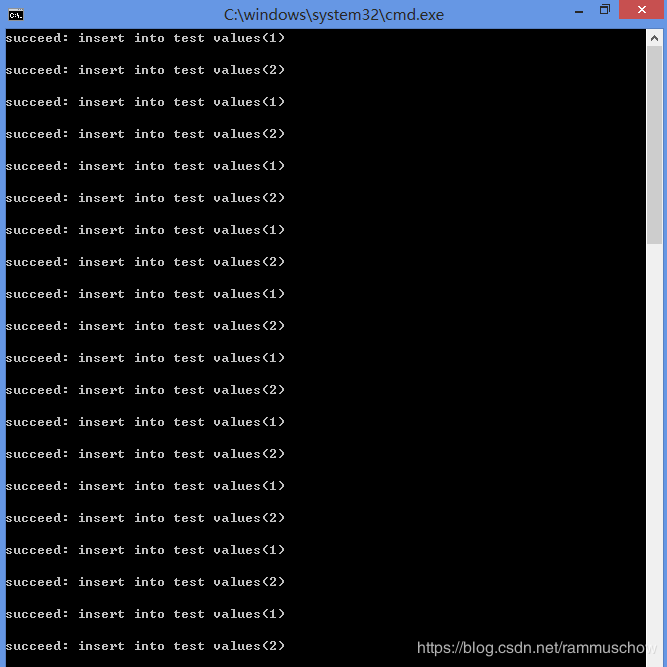sqlite3 "database is locked"
问题原因
sqlite3_exec对于执行create table、insert、update等操作,会对整个数据库加锁,导致加锁期间其他连接执行sqlite3_exec()失败,返回“database is locked”,错误码为5。
测试:创建两个线程,线程1向test表插入数值1,线程2向test表插入数值2,每个线程内循环执行10次,观察现象。
#include "sqlite3.h"
#include
#include
using namespace std;
//线程入口函数
DWORD WINAPI Sqlite3ExecSql(LPVOID lpParamter)
{
char *msg = NULL;
sqlite3 *db = NULL;
int nRC = 0;
char szSqlite3Path[1024] = { 0 };
int nCount = 0;
char *pszSql = (char*)lpParamter;
_snprintf(szSqlite3Path, sizeof(szSqlite3Path), "%s\\%s", "F:\\VS2013Workspace\\SqliteTest\\SqliteTest", "LockTest.db");
while (1){
if (nCount == 10)
break;
//打开数据库
nRC = sqlite3_open(szSqlite3Path, &db);
if (SQLITE_OK != nRC) {
cout << "error code:" << nRC << endl;
return -1;
}
//执行sql语句
nRC = sqlite3_exec(db, pszSql, 0, 0, &msg);
if (nRC != 0){
cout << "failed: " << pszSql << "\t" << "err msg:" << msg << ", " << "code: " << nRC << endl << endl;
}
else{
cout << "succeed: " << pszSql << endl << endl;
}
sqlite3_close(db);
nCount++;
Sleep(100);
}
return 0;
}
void main(){
int nRC = 0;
char szSqlite3Path[1024] = { 0 };
sqlite3 *db = NULL;
char *msg = NULL;
_snprintf(szSqlite3Path, sizeof(szSqlite3Path), "%s\\%s", "F:\\VS2013Workspace\\SqliteTest\\SqliteTest", "LockTest.db");
//创建数据库
nRC = sqlite3_open(szSqlite3Path, &db);
if (SQLITE_OK != nRC) {
cout << "error code:" << nRC << endl;
return;
}
//创建表
nRC = sqlite3_exec(db, "create table IF NOT EXISTS test(a int)", 0, 0, &msg);
if (nRC != 0){
cout << "error code:" << nRC << ",msg: "< 执行结果:
结论:
当其中一个线程正在执行SQL语句期间,发生线程调度,另一个线程也开始执行SQL语句,此时线程一已对数据库加锁且未释放,线程二没有执行权限,导致线程二执行sqlite3_exec返回错误码5,错误信息"database is locked"。
解决方案
调用sqlite3_exec()之前,调用sqlite3_busy_timeout()设置锁等待时间。sqlite3_busy_timeout针对数据库句柄,设置执行sql语句的默认等待时间,如果在执行期间,数据库被锁住,sqlite3_exec()会不断重试,直到执行成功或者等待超时。
#include "sqlite3.h"
#include
#include
using namespace std;
//线程入口函数
DWORD WINAPI Sqlite3ExecSql(LPVOID lpParamter)
{
char *msg = NULL;
sqlite3 *db = NULL;
int nRC = 0;
char szSqlite3Path[1024] = { 0 };
int nCount = 0;
char *pszSql = (char*)lpParamter;
_snprintf(szSqlite3Path, sizeof(szSqlite3Path), "%s\\%s", "F:\\VS2013Workspace\\SqliteTest\\SqliteTest", "LockTest.db");
while (1){
if (nCount == 10)
break;
//打开数据库
nRC = sqlite3_open(szSqlite3Path, &db);
if (SQLITE_OK != nRC) {
cout << "error code:" << nRC << endl;
return -1;
}
//设置超时等待时间:1s
sqlite3_busy_timeout(db, 1000);
//执行sql语句
nRC = sqlite3_exec(db, pszSql, 0, 0, &msg);
if (nRC != 0){
cout << "failed: " << pszSql << "\t" << "err msg:" << msg << ", " << "code: " << nRC << endl << endl;
}
else{
cout << "succeed: " << pszSql << endl << endl;
}
sqlite3_close(db);
nCount++;
Sleep(100);
}
return 0;
}
void main(){
int nRC = 0;
char szSqlite3Path[1024] = { 0 };
sqlite3 *db = NULL;
char *msg = NULL;
_snprintf(szSqlite3Path, sizeof(szSqlite3Path), "%s\\%s", "F:\\VS2013Workspace\\SqliteTest\\SqliteTest", "LockTest.db");
//创建数据库
nRC = sqlite3_open(szSqlite3Path, &db);
if (SQLITE_OK != nRC) {
cout << "error code:" << nRC << endl;
return;
}
//创建表
nRC = sqlite3_exec(db, "create table IF NOT EXISTS test(a int)", 0, 0, &msg);
if (nRC != 0){
cout << "error code:" << nRC << ",msg: "< 执行结果:
结论:在等待时间内,线程重新获得CPU控制权并且锁已被另一个线程释放,sqlite3_exec就可以执行成功,因此所有插入全部执行成功。

